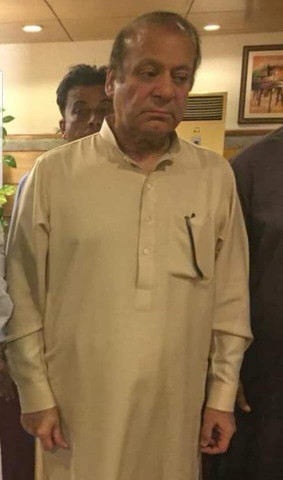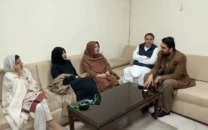IHC suspends Nawaz Sharif’s sentence for eight weeks on medical grounds
Nawaz to submit two surety bonds of Rs2 million each

Nawaz Sharif. PHOTO: PML-N
Bail has been granted for eight weeks and the former premier has been instructed to deposit two surety bonds of Rs2 million each.
The three-time premier was awarded a seven-year sentence by an accountability court earlier.
On Saturday, Shehbaz Sharif had filed another petition requesting IHC to hear the bail plea sooner due to the former premier's deteriorating health. Nawaz was granted bail till Tuesday (today) after the National Accountability Bureau (NAB) removed objections on "humanitarian grounds".
The high court directed Nawaz to submit two surety bonds worth Rs2 million each. The decision came hours after the Punjab government revealed Nawaz suffered an angina attack.
On Friday, Nawaz secured bail on medical grounds in the Chaudhry Sugar Mills inquiry from the Lahore High Court.
The PML-N supremo was admitted to the hospital on October 21. He was diagnosed with acute idiopathic thrombocytopenic purpura (ITP) and is undergoing Intravenous Immunoglobulin (IVIg) therapy at Services Hospital in Lahore. The five-day therapy ends today.
Nawaz likely to be shifted to Sharif Medical City in Raiwind
Today's court proceedings
During the hearing today, conducted by a tw0-member bench comprising Justice Amir Farooq and Justice Mohsin Akhtar Kiyani, Services Hospital Managing Director Dr Saleem Cheema informed the bench that the medical board had its seventh meeting on Tuesday which also included Nawaz’s personal physician Dr Adnan Malik.
Dr Cheema updated the high court regarding Nawaz’s treatment and said: “Nawaz’s platelet count is 30,000 – which is low for a patient. The count fluctuates due to Nawaz’s cardiovascular history.”
When the bench asked if Nawaz could survive without being admitted in a medical facility, Dr Cheema replied in the negative.
Dr Adnan added that Dr Tahir Shamsi of Services Hospital had said that the reason behind declining platelet count has not been ascertained.
Justice Farooq then inquired whether Dr Malik had examined Nawaz’s medical reports. “Yes I have,” said the doctor. “Nawaz’s platelet count remains low which when combined with his cardiovascular history is a dangerous sign. The medical board has decided to run a full-body scan tomorrow.”
The physician also expressed concern over Nawaz's deteriorating health and said Nawaz was "battling for his life".
When Justice Farooq asked if the treatment to increase the platelet count can affect the heart, he was informed by Khawaja Haris that due to multiple pathologies, treatment of one disease impacts another. “Cardiac history affects the platelet count,” he added.
Addressing Nawaz’s counsel Khawaja Haris, Justice Kiyani asked whether they were satisfied with the medical treatment provided to the former premier. “No. The medical board itself has admitted its failure to diagnose. The hospital also lacks several facilities - there is no cardiac unit, the blood has to be sent to outside labs for testing.”
Haris, however, clarified that the objection was not against the medical board. “They are trying their best. But who will they [authorities] punish if Nawaz dies? It is important for a suspect to stay alive.”
Haris explained that a low platelet count could cause paralysis or another heart attack. “Nawaz suffered an angina attack due to low platelet count. His body is not making platelets and doctors are maintaining it artificially.”
“Although Nawaz has been diagnosed with ITP – low platelet count – but the source has not been identified yet. Nawaz should be allowed to get the treatment of his choice,” said Haris pleaded further.
Justice Farooq also inquired about other matters connected to the case. “What happens if Nawaz is unable to complete his sentence? What will be the procedure if he recovers after being granted bail? When should bail end if we are unsure about the time-frame?”
Haris informed the bench that the National Accountability Bureau (NAB) can request cancellation of the bail.
Justice Farooq also observed that the federal government was empowered to make decisions in matters related to prisoners who are ill and questioned why the executive was not using its authority.
NAB additional prosecutor Jahanzeb Bharvana argued that the doctors had not implied the treatment cannot be completed in Pakistan. He requested the high court to use the Supreme Court’s March 26 order granting Nawaz a six-week suspension of sentence on medical grounds.
The apex court had restricted Nawaz from travelling abroad. “This is a federal matter since NAB operates under the federal government.”
NAB expressed its opposition to Nawaz being allowed to go abroad for medical treatment. NAB maintained that Nawaz should be granted bail for a limited period. “Or the bail plea can be adjourned until fresh medical tests are conducted,” said Bharvana. “Our stand is based on humanitarian grounds.”
“Who regulates custody of a prisoner sentenced by a court in Islamabad?” said Justice Farooq. He reminded the NAB additional prosecutor that both Adiala and Kot Lakhpat jails come under the jurisdiction of Punjab.
Advocate general Tariq Jahangiri informed the bench that prisoners were sent to jails in Punjab since Islamabad did not have one. To this, Justice Kiyani remarked that “to this day, no one had thought of constructing a prison in the federal capital”.
The bench questioned who decides the fate of prisoners in such situations. “The provincial government has the authority to decide on issues related to prisoners sentenced by Islamabad courts,” responded Jahangiri.
"Was the order to move Nawaz to the hospital when his health deteriorated given by Islamabad’s chief commissioner?” asked Justice Kiyani. Justice Farooq observed that the executive shying from using its authority was a tragedy.
Hariss said the executive could not issue an order if the matter is pending in court – appeals for overturning verdict and suspension of sentence in the Al Azizia reference is also pending.
Justice Kiyani observed that the federal and provincial government have not taken a clear stance on the matter. Justice Farooq observed that there were three options in the current situation. “The first option would be to grant a suspension of sentence. Second would be to grant conditional bail as suggested by NAB and third would be to let the government decide.”
When Hariss expressed concerns over letting the government decide, Justice Kiyani said governments are above political differences. “Prime minister and chief ministers do not only belong to their party – they govern over the entire country and province respectively.”
Hariss pointed out that the attorney general had opposed three-day bail on medical ground as well.
“If the government decides, it will not be called a ‘deal’. A perception has been created through tv channels that a deal is being made,” observed Justice Kiyani.
The bench then reserved the verdict. It will be announced later today.
This is a developing story and will be updated accordingly.



















COMMENTS
Comments are moderated and generally will be posted if they are on-topic and not abusive.
For more information, please see our Comments FAQ